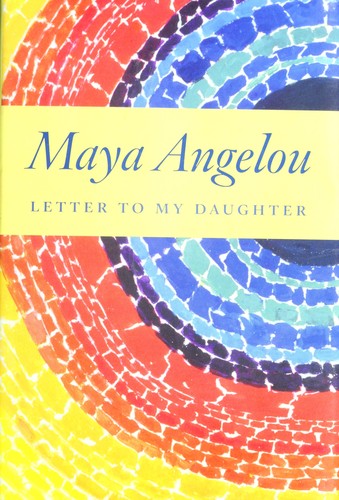In 2008, the world received a precious gift: Letter to My Daughter by the incomparable Maya Angelou. This small but mighty volume, a collection of essays presented as advice to an adopted daughter, transcends the typical self-help genre. Angelou, a poet, memoirist, and civil rights activist, wasn’t just sharing wisdom; she was offering a glimpse into a life lived fully, a life marked by struggle and triumph. Published later in her career, the book feels like a capstone, a distilled essence of the lessons she’d gathered across a lifetime of experience. It’s a testament to her enduring relevance and continues to resonate deeply with readers navigating their own paths.
Content Overview
Letter to My Daughter is not a linear narrative; instead, it’s a mosaic of reflections on love, loss, identity, and the enduring power of the human spirit. Angelou eschews chronological storytelling in favor of thematic explorations. She tackles topics ranging from the significance of names to the importance of self-respect, all the while infusing each piece with her signature blend of poetic grace and unflinching honesty. The book is structured as a series of short, digestible essays, making it perfect for reading in small doses or in one sitting, depending on the reader’s preference. The target audience is broad, encompassing anyone seeking guidance, solace, or a deeper understanding of life’s complexities, but it especially resonates with women coming into their own. Find on Amazon.
Practical Application
While not a self-help manual in the conventional sense, Letter to My Daughter offers invaluable practical applications. The book champions the idea of self-reliance and emotional resilience. For instance, Angelou’s reflections on forgiveness encourage readers to let go of past hurts and embrace the present. Her emphasis on the importance of reading and intellectual curiosity serves as a reminder of the power of education to transform lives. She shares anecdotes of her own struggles, demonstrating that setbacks are not failures but rather opportunities for growth. Her words are not just aspirational; they are deeply grounded in real-life experiences, making her advice all the more potent. The lessons are not just theoretical but are actionable, encouraging the reader to reflect on their own experiences.
Research & Authority
Angelou’s authority stems not from academic credentials but from a life richly lived. Her wisdom is derived from firsthand experiences as a black woman navigating a world marked by racism and sexism. Her powerful voice, honed through years of poetry and prose, imbues the text with undeniable authenticity. She doesn’t rely on external research; instead, her source is her own life. The book is not groundbreaking in a scholarly sense, but it does offer a unique perspective on life from one of the most powerful voices of our time. It’s a deeply personal exploration of universal themes, delivered with the gravitas and insight that only Angelou could provide. This personal and authentic approach has garnered immense respect from a wide audience.
Writing Style & Narrative Techniques
Angelou’s writing style is instantly recognizable: lyrical, rhythmic, and deeply evocative. Her prose is infused with the cadence of oral storytelling, making the book feel both intimate and profound. She masterfully blends personal narrative with universal truths, creating a tapestry of insights that resonate on multiple levels. The pacing is deliberate, allowing the reader to absorb each lesson before moving on to the next. There is no dialogue in this work since it is presented as a series of essays, but her voice is so distinctive that it feels as though she is speaking directly to the reader. Angelou’s use of metaphor and simile adds layers of meaning to her reflections, making them both accessible and thought-provoking. Her voice is both gentle and firm, encouraging and challenging. Purchase here.
One particular essay that resonated deeply with me was her discussion on the power of words. She talks about how words can both build up and tear down, emphasizing the responsibility we all have to use language carefully. She shares her personal experience of being called derogatory names as a young black girl, and the impact it had on her. This deeply personal experience helped me see the impact my words can have on others, especially children. It was a simple but powerful message, a reminder that each word carries weight and that we should always strive to use our language for good.
Conclusion
Letter to My Daughter is more than just a book; it’s a lifeline, a source of wisdom, and a testament to the enduring power of the human spirit. It matters because it reminds us of the importance of self-love, compassion, and resilience, all presented with the grace and wisdom only Maya Angelou could provide. The book leaves a lasting impact, prompting self-reflection and inspiring readers to live more deliberately and authentically. It is a book that readers will return to time and again, discovering new layers of meaning with each reading. I recommend it to anyone seeking a dose of inspiration, guidance, or simply a comforting voice in a turbulent world. Click to buy.
Readers who enjoyed Letter to My Daughter might also appreciate other works by Maya Angelou, such as her autobiographical masterpiece I Know Why the Caged Bird Sings. Other similar books include The Gifts of Imperfection by Brené Brown, which focuses on embracing vulnerability, and Tiny Beautiful Things by Cheryl Strayed, which offers compassionate advice through a compilation of her “Dear Sugar” columns. These books all share a similar focus on personal growth, emotional resilience, and the power of authentic human connection. They offer similar themes and styles that will appeal to readers who enjoyed Angelou’s unique blend of personal narrative and profound insight. Her book is a gift that continues to give, long after the final page is turned. Check the price

